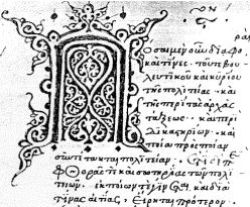48 - Constitutional Conventions: Aristotle's Political Philosophy
Posted on
Peter looks at the ideal arrangement of the state in Aristotle’s Politics, his critique of Plato’s Republic and his views on slavery.
Themes:
Further Reading
• D. Keyt and F.D. Miller, Jr. (eds), A Companion to Aristotle's Politics (Oxford: 1991).
• R. Kraut, Aristotle: Political Philosophy (Oxford: 2002).
• C. Lord and R. Bodeüs, (eds), Essays on the Foundations of Aristotelian Political Science (Berkeley: 1991).
• G. Patzig, (ed.), Aristoteles' Politik (Göttingen: 1990).
• C.J. Rowe and M. Schofield (eds), The Cambridge History of Greek and Roman Political Thought (Cambridge: 2000).
Stanford Encyclopedia: Aristotle's Politics
In Our Time: Aristotle’s Politics

Aristotle


 ..
..



Comments
I-Tunes Glitch
Hi Peter -
"Episode 48 Consitutional Conventions" seems to have found its way onto itunes under the title "Episode 49 Stage Directions" (unless its just my itunes client getting confused)
- Jon
In reply to I-Tunes Glitch by Jon
Title mix-up
Yes, you're right - actually that was the right sound file but I stupidly pasted next week's title onto it. Thanks for catching that, it's been fixed now.
Peter
Aristotle's view of Plato's Republic
[Possibly this will be discussed on the later episode pn Plato in Aristotle. If so I apologise.]
There are those who argue today that we should not read the Republic as a political blueprint or utopia but rather merely as a discussion of justice in the individual in which the city state describe serves only as a model of the individual's mind/soul.
Whilst listening to this episode on Aristotle's Politics it struck me that we should be able to answer this question based upon Aristotle's response to Plato.
He could say 'Don't be confused by Plato's description of the ideal state since as he often reminded me it was purely intended as a model of the soul", on the other hand if Aristotle addresses the Republic as a serious Political text then surely that is a definitive answer to those who seek to defend Plato against totalitarianism etc?
In reply to Aristotle's view of Plato's Republic by Felix
Aristotle on the Republic
Hi Felix,
We don't really get into this in episode 50 actually, so I'm glad you've raised it. You make a good point: surely Aristotle would know whether or not the political proposals are "serious"? But I guess that the political part of the Republic is too complex and detailed to be merely a sketch for the purpose of establishing the "real" goal which is to have a good account of virtue in the soul. The politics should be taken seriously as one part of Plato's objectives, and the more over-the-top suggestions (e.g. community of women and children) can't just be dismissed as unserious. However, Aristotle also seems to think that Plato's "how would we do it if we started from scratch" approach is rather limited. He does discuss ideal arrangements but is at least as interested in describing, and giving advice regarding, already existing political constitutions. So, I'd say that Aristotle's evidence about Plato's intention is subtle: he takes it seriously as a set of genuine recommendations, but questions whether it is closely enough tied to practicality. (And of course Plato himself seems to admit that the existence of such a state is a rather remote possibility.)
Peter
In reply to Aristotle on the Republic by Peter Adamson
Aristotle's view of Plato's Republic
Peter,
thanks for your response.
Since Aristotle "takes it seriously as a set of genuine recommendations", it is curious to me that there are still scholars (e.g. Julia Annas, I beleive) saying "No, no, it's just a metaphor". How can this be? :-)
Which book on Aristotle to buy?
Hi Peter,
I'm looking at the list of general works on Aristotle that you suggested and trying to decide which to buy.
It seems to me that the Barnes 1982 is too short (only 100 pages) and the Lloyd 1968 is too dated. Which of the others (or alternative) would you recommend on the basis of readability?
Many thanks
In reply to Which book on Aristotle to buy? by Felix
General book on Aristotle
The Cambridge Companion is pretty useful but actually you might just wait for a few months, at which point there will be a new Oxford Handbook of Aristotle, ed. by Chris Shields. It will be state of the art with lots of papers, by many of the main scholars on Aristotle; and actually it will have a chapter by me on the Arabic reception of Aristotle. I think it will be out in the first half of 2012.
In reply to General book on Aristotle by Peter Adamson
General book on Aristotle
Actually, that sounds a bit to scholarly and long for me!
Also, it is showing as $150.
http://www.oup.com/us/catalog/general/subject/Philosophy/History/?view=…
In reply to General book on Aristotle by Felix
I bought the Cambridge
I bought the Cambridge Companion to Aristotle, ed. Jonathan Barnes and I am very pleased with it. It is difficult ... but not too difficult.
Ancient abolitionism
Hi Prof. Adamson,
You mention in this episode that Aristotle refers to people who hold all forms of slavery to be unnatural. Would you mind pointing me to the section in the "Politics" that contains this reference to this ancient abolitionism? Thank you!
In reply to Ancient abolitionism by Daniel Hulseapple
Slavery
It's at Politics book 1 chapter 6.
Dogma
Making a normative judgement of Aristotle's observations on the simple basis of current political dogma is a potential pitfall, I guess. Ten years after the recording, democracy has fallen somewhat out of favor and is now often called populism. The prevailing progressive political dogma which we cannot criticize is eternally being eroded, slowly, by its very lack of counterforces. Maybe such dogma is better left to its own devices; it is always doomed, and I guess we will be doomed with it if we become too enthusiastic about some of our pet manifestations of it for too long.
Or maybe I have just been listening to the Indian section for too long.
Politeia
Late to the party: one note about the use of the term "politeia" that could help clear the confusion. I read Scolefield's book about Plato's Republic for my PhD. As you well know, the Republic's original name too is the Politeia. Scolefield argues that politeia is a political subgenre shared by athenian oligarchy and Sparta's sympathizer. In many ways the Politeia is an idealized version of sparthan constitution for the Greek elite Aristotele is talking to. I think that put the opposition between Democracy and Politeia in Aristotele under a different light.
In reply to Politeia by FedericoV
Politeia
Well, I’d issue a slight caution there which is that it isn’t so clear in what sense Plato’s dialogues had “titles” as they came to have in later antiquity; but Aristotle does refer to them by certain names and Politeiea for the Republic might be one of them, I’d have to check that. Anyway the Greek word just means “constituition” or “political system” so that is worth bearing in mind for sure.
In reply to Politeia by Peter Adamson
POLITEIA
Just thanks for taking time for replying me Peter. I love your work. I reread my post and maybe I stretched things a little bit. I just trusted Scholefield on the other hand :).
Add new comment